AI is revolutionizing the way content is created. From generating high-quality blog posts to crafting personalized marketing materials, artificial intelligence has become an indispensable tool for businesses and creators alike. But how do you use AI ethically, effectively, and in a way that aligns with your business goals? This comprehensive AI content creation guide will walk you through everything you need to know—from selecting the best AI tools to enhancing content quality and staying ahead in SEO.
Understanding AI Content Creation
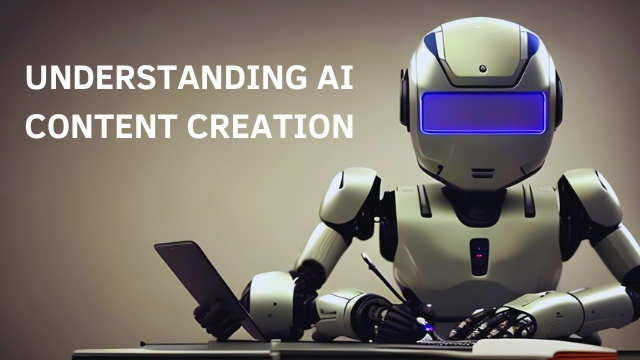
AI content creation involves using artificial intelligence models to generate, edit, and optimize digital content. These AI systems are trained on massive datasets to understand human language patterns and produce text, images, and even videos with minimal human intervention. However, AI is a tool—not a replacement—for human creativity. The key is knowing how to use it strategically.
How AI Works in Content Creation
AI-driven content tools operate based on machine learning models that analyze vast amounts of text data, recognize patterns, and generate coherent and structured content. Some of the most common AI-powered capabilities include:
- Natural Language Processing (NLP): Helps AI understand and generate human-like text.
- Text Generation: Creates blog posts, product descriptions, and more with AI-generated content.
- Content Summarization: Condenses long-form content into shorter, more digestible summaries.
- SEO Optimization: AI helps refine keyword placement and improve readability.
Choosing the Right AI Tools for Content Creation
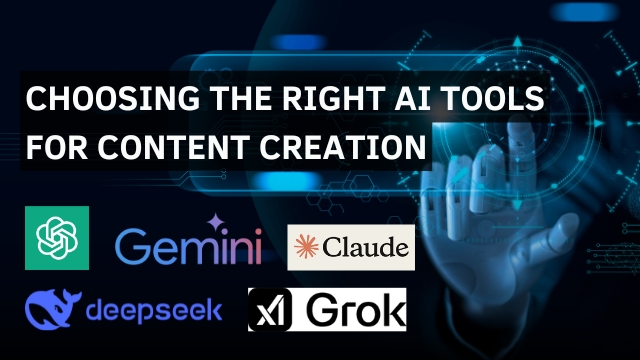
Not all AI content tools are created equal. Here’s a look at some of the most powerful AI-driven platforms designed for content creation.
Free AI Tools for Content Generation
| AI Tool | Key Features | Best For |
|---|---|---|
| ChatGPT | Text-based content generation, brainstorming ideas | Bloggers, marketers, general users |
| Gemini | Google’s AI tool, integrates with workspace tools | Content teams, research-based work |
| Claude AI | Advanced natural language understanding | Technical writing, detailed research |
| DeepSeek | High accuracy for logic-based content | Developers, analysts |
| Grok AI | Data-driven insights, conversational responses | Social media, quick responses |
Paid AI Tools for Businesses
| AI Tool | Strengths | Weaknesses |
|---|---|---|
| JasperAI | Great for short-form content, integrates with marketing tools | Prone to inaccuracies, requires detailed prompts |
| ContentShake | SEO-focused, integrates with analytics | Lacks creativity, additional cost required |
| Writesonic | Fast content generation, multiple writing styles | Generic outputs need editing |
Best Practices for Using AI in Content Creation
1. Define Your Content Goals
Before you start using AI, set clear goals for your content. Are you looking to:
- Increase organic traffic?
- Boost engagement on social media?
- Improve your brand’s online presence?
AI works best when guided by a well-defined strategy.
2. Use AI as an Assistant, Not a Replacement
AI can generate content, but it lacks human creativity and emotional intelligence. Use it to draft ideas, refine structure, and enhance productivity, but always edit and add a human touch.
3. Optimize for SEO with AI
Many AI tools can suggest keyword placement and improve readability. However, to ensure high-ranking content, focus on:
- Using primary keywords naturally
- Including long-tail keywords for better targeting
- Maintaining a proper content structure with headings and bullet points
4. Fact-Check AI-Generated Content
One of the biggest downsides of AI is its tendency to generate inaccuracies or “hallucinations.” Always verify facts and sources before publishing AI-assisted content.
5. Develop a Unique Brand Voice
AI-generated content can sound robotic or generic. Ensure that your brand’s personality, tone, and style remain consistent by refining AI drafts with manual edits.
When to Use AI for Content Creation
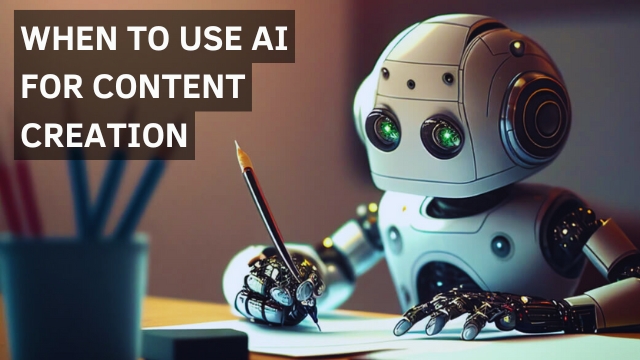
There are situations where AI can be highly beneficial, and others where human expertise is irreplaceable.
Ideal Use Cases for AI in Content Creation:
- Generating content outlines.
- Creating first drafts of blog posts and articles.
- Writing product descriptions and metadata.
- Analyzing SEO performance and keyword trends.
When NOT to Rely on AI Alone:
- Producing thought leadership or opinion pieces.
- Handling sensitive or industry-specific content requiring deep expertise.
- Creating highly emotional or storytelling content.
Pros and Cons of AI Content Creation
Pros:
- Increases content production speed.
- Reduces repetitive writing work.
- Helps generate ideas and overcome writer’s block.
- Enhances SEO optimization with keyword analysis.
Cons:
- May produce inaccurate or outdated information.
- Lacks deep human creativity and emotions.
- Ethical concerns over AI-generated plagiarism.
How AI is Shaping the Future of Content & SEO
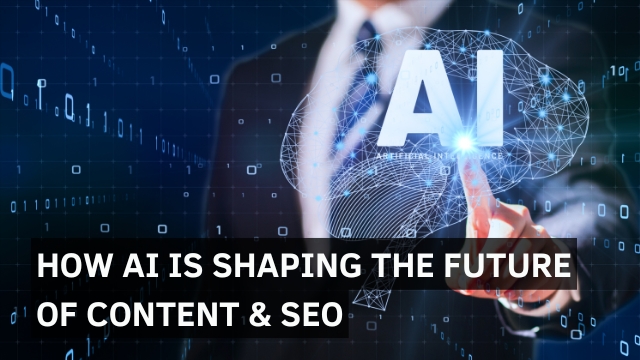
AI is revolutionizing the way search engines analyze content. Google’s evolving algorithms are prioritizing:
- Expertise, Authority, and Trustworthiness (E-A-T): Human verification and quality control are essential.
- User Experience Signals: AI-generated spam is being penalized, while valuable, well-structured content is favored.
- Voice Search & Conversational AI: Future SEO will focus on natural, voice-friendly content.
Rather than replacing human creators, AI is becoming a powerful tool to enhance content quality, strategy, and engagement.
Final Thoughts
AI content creation is here to stay, offering incredible opportunities to improve efficiency and streamline content production. However, its success lies in using AI wisely and ethically—as a complement to human expertise rather than a replacement.
If you’re looking to boost your content strategy with AI, start by experimenting with different AI tools, refining outputs, and maintaining a human-centric approach. The future of AI and content creation is all about balance, strategy, and creativity—and those who master this will thrive in the digital landscape.
Frequently Asked Questions About AI in Content Creation
Q1. How can AI improve my content marketing strategy?
Answer: AI helps automate repetitive tasks, generate insights, and speed up content creation while allowing human creators to focus on strategic storytelling.
Q2. Does Google penalize AI-generated content?
Answer: Not necessarily. Google ranks content based on quality, originality, and value to users—regardless of whether it was created by a human or AI.
Q3. Which industries benefit the most from AI content creation?
Answer: AI is widely used in digital marketing, e-commerce, journalism, and customer support to generate quick, scalable content solutions.
Q4. What are the limitations of AI-generated content?
Answer: AI can generate text quickly, but it lacks creativity, emotional intelligence, and deep industry-specific knowledge.
Q5.Can AI replace human writers?
Answer: No. AI is a tool that enhances productivity but cannot replace human creativity, storytelling, and expertise.
Author Profile

- Nitin Jain - C.E.O - India PR Distribution
- Nitin Jain is the founder and C.E.O of India PR Distribution - India's top Press Release Distribution and PR Agency. Nitin has more than 20 years of experience in PR, Corporate Communications, Digital Marketing, Branding Strategy and Lead generation.
Latest entries
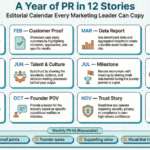 Press releaseJanuary 31, 2026A Year of PR in 12 Stories: The Editorial Calendar Every Marketing Leader Can Copy
Press releaseJanuary 31, 2026A Year of PR in 12 Stories: The Editorial Calendar Every Marketing Leader Can Copy EntrepreneursJanuary 5, 2026Nitin Jain Entrepreneur Behind India PR Distribution Success
EntrepreneursJanuary 5, 2026Nitin Jain Entrepreneur Behind India PR Distribution Success Press releaseNovember 20, 2025Meet Nitin Jain: CEO of India PR Distribution
Press releaseNovember 20, 2025Meet Nitin Jain: CEO of India PR Distribution Search OptimizationSeptember 16, 2025What Is Digital PR and Why It Matters for SEO Success
Search OptimizationSeptember 16, 2025What Is Digital PR and Why It Matters for SEO Success

